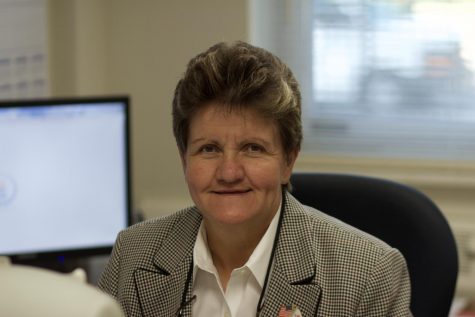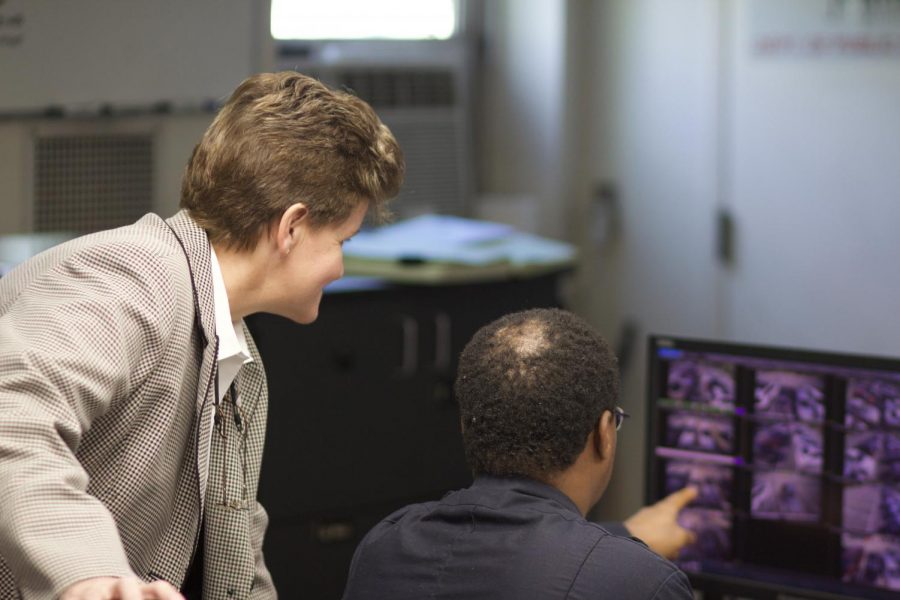Denise Vencak became the second woman to run Public Safety here at St. John’s in the school’s nearly 150-year history — and the first to do so on a permanent basis — when she was named executive director this past June.
Vencak, who started as a sergeant for Public Safety 25 years ago, said in a recent wide-ranging interview with the Torch that she has a “vested interest” in the University.
“I hope and I think the students feel safe when they’re here,” Vencak said. “We try to make sure that they feel that way, and we do our best to make sure that that happens. We have a lot of security in place here, and sometimes the students don’t like the security that’s in place, like how you have to use your ID card to go in and out of certain buildings, but that’s there to protect students.”
Vencak, who replaced longtime Public Safety director Tom Lawrence who retired, is a retiree of the NYPD like many Public Safety officers. She said about 60 percent of Public Safety staff come from “some prior law enforcement.”
But she stressed that just like in any other job change, those who make the transition from law enforcement to Public Safety here need to adjust their approach.
“We’re not police officers; police officers have a different power,” she said. “We don’t have the powers of arrest, so we’re not here to arrest a student or to take any action on the student unless the student’s doing something to another student, someone in the community, or the student’s going to hurt themselves.
“Public Safety is part of the University community, we’re not part of the NYPD, we’re not part of any outside agency. We’re here to help our community.”
According to Vencak, Public Safety officers undergo between 35 and 40 hours a year for training, as well as mandatory diversity training.
“I know what it is to be in direct contact everyday with students, so I enforce that and I stay positive to let students know that we’re there for them,” she said. “I want the students to be able to trust the Public Safety officers, I want them to be able to come to the Public Safety officers, I want them to consider them as friends.
“And I think that across the board we have that already, but we always look to enhance that, that the students feel comfortable with us and they’re willing to come to us for anything.”

Denise Vencak hopes to make friendships with students.
Vencak says she is confident that current campus security policies are keeping students safe, but added that new precautions continue to be implemented both stateside and abroad.
“We continuously monitor the conditions on campus,” Vencak said. “We check lighting on a weekly basis, we have emergency phones — we call them the blue light phones — we check them to make sure they’re all working, we’ll add cameras depending on what’s going on. We’re continuously evolving and adding security.”
Vencak added that the University is conducting a security assessment of the Queens campus in tandem with organizations such as the New York Police Department’s Counterterrorism Bureau and New York City’s Emergency Management team.
“We have a great relationship with the NYPD, with the emergency service unit,” Vencak said. “They’re here for most of our games, and they’re here strictly in case something does happen, not here as police officers to take in [students].”
Public Safety is also looking to strengthen security around Carnesecca Arena, which draws especially large crowds throughout basketball season; Vencak said the University will be installing new equipment within the next month to establish just that, and added that the adjustments will be so subtle that students will likely not even notice them.
“We just continually enhance and adjust [safety procedures] based on what’s going on in the world.” Vencak said.
Vencak is not only responsible for heading campus security in Queens; she says that she and her stateside team collaborate with what she refers to as the University’s global Public Safety team abroad. She says that while “the approach is the same” in terms of keeping our campuses abroad secure, there are added tools and techniques Public Safety uses to do so.
“We do have cameras [over there] and monitor the global campuses from here,” Vencak said.
On the University’s Rome and Paris campuses, the watchmen who occupy each lobby desk continuously keep in contact with Vencak and her team, calling in at least three times a day to keep them updated. Other policies include Vencak and her team checking in with the Overseas Security Advisory Council (OSAC) daily, and monitoring social media for real-time updates.
Under Vencak’s leadership, Public Safety has implemented briefing students who are abroad on safety measures at the end of every week to prepare them for going off-campus for the weekend; this measure includes a form that students are encouraged to fill out when leaving for their long weekends.
“It used to just be a suggestion, now it’s a little bit more of a push.” Vencak said, adding that it is still voluntary.
Vencak says her main focuses in her new role not only include making students feel safe on campus, but also ensuring that the relationship between the student body and Public Safety is one of trust.
“I’ve been meeting with a lot of the student groups, I’ve had a one-on-one with Haraya and SGI, and I have planned meetings with a couple of the other groups here on campus,” she said. “I’m willing to meet with any of the groups.”















Alvin • Apr 2, 2018 at 4:15 pm
I am almost finished with my book!!
I have left a message for Joe. O.
not looking for anything , But the Truth will come out. Do really think! You know!
If you REALLY want to know call me (845) 798-8462.
If not it’s ok.